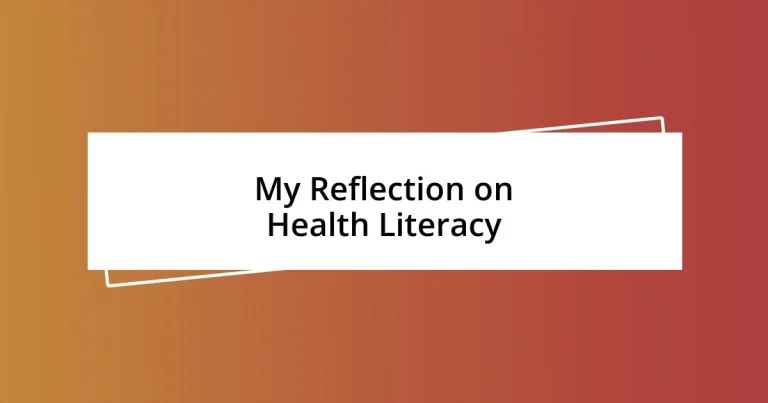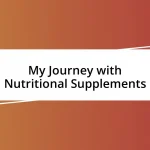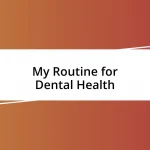Key takeaways:
- Health literacy empowers individuals to make informed health decisions, affecting both personal well-being and public health equity.
- Identifying barriers—such as complex language, socioeconomic factors, and cultural differences—can impede understanding and access to health information.
- Engaging effectively with healthcare professionals and utilizing reliable resources significantly improves health literacy and personal health outcomes.
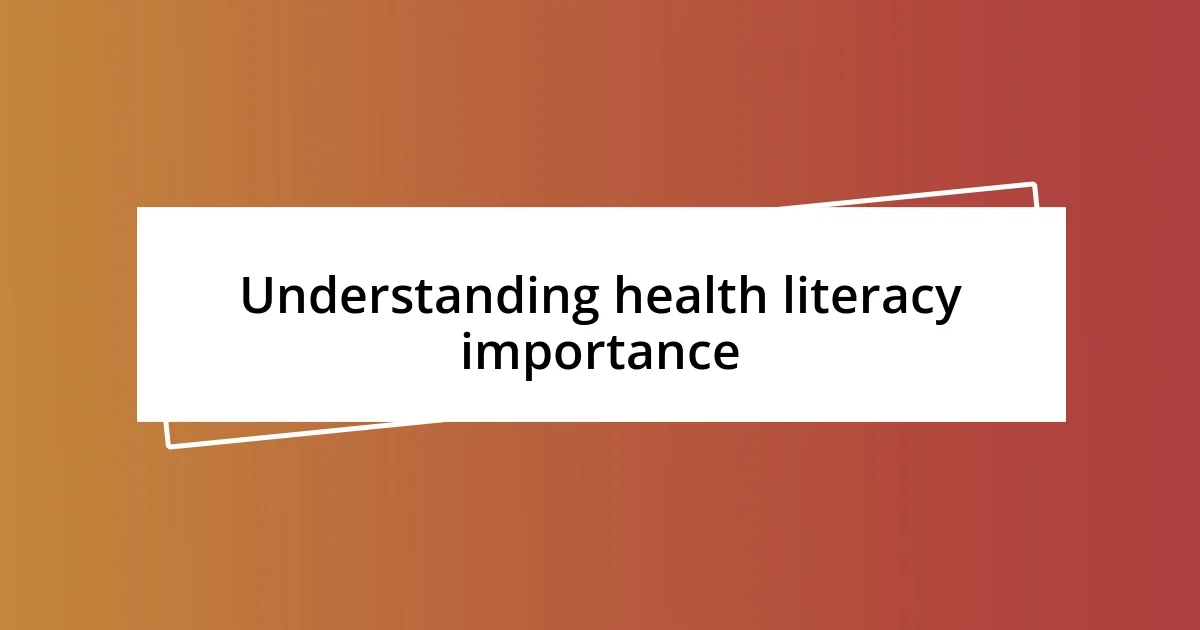
Understanding health literacy importance
Health literacy is crucial because it empowers individuals to make informed decisions about their well-being. I remember a time when I was overwhelmed by medical jargon during a doctor’s visit. The frustration I felt made me realize just how important it is to understand health information. When people can interpret health resources effectively, they’re more likely to follow medical advice and manage their conditions.
Another aspect of health literacy importance is its role in health equity. It’s alarming to see how those with lower health literacy often face worse health outcomes. Have you ever considered how this gap affects your community? I’ve seen friends struggle with understanding their diagnoses, which could be avoided with better access to health information. By promoting health literacy, we can bridge these gaps and create a more informed society.
Moreover, the landscape of health information is vast and varied; the internet today is filled with credible and less credible resources. In my own experience, navigating this digital age can be daunting. It begs the question: how do we differentiate between reliable and misleading information? Recognizing the importance of health literacy helps us become discerning consumers of information, ultimately leading to better health choices and outcomes.
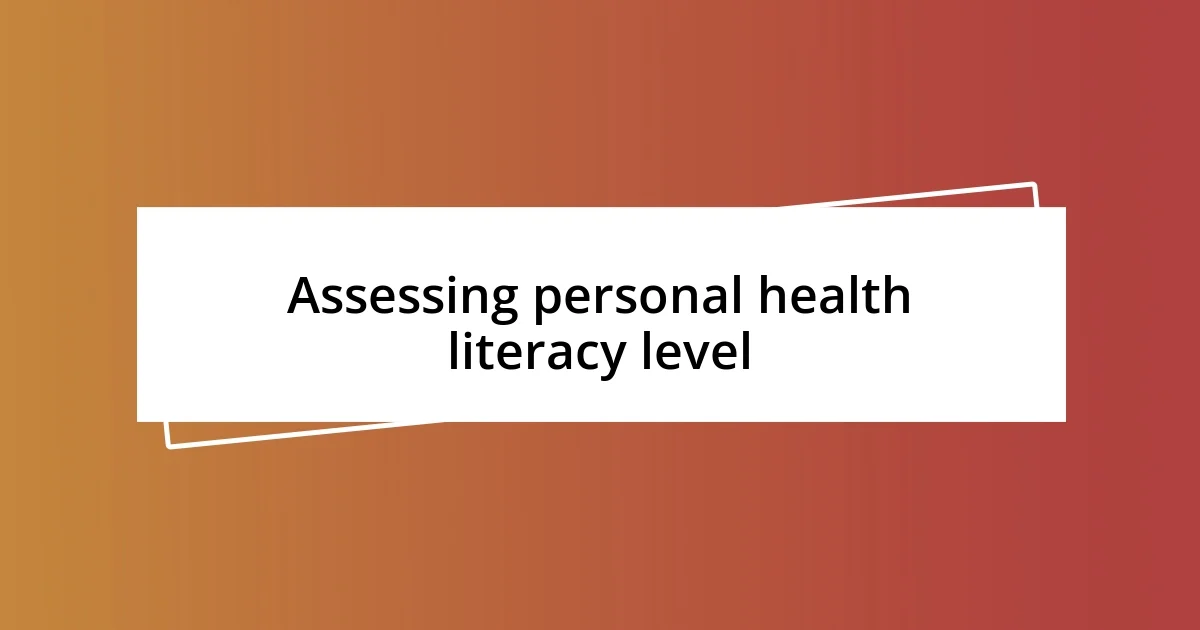
Assessing personal health literacy level
Determining my personal health literacy level has been a revealing journey. I recall sitting in a waiting room, leafing through brochures, and feeling a mix of confusion and curiosity. Those moments prompted me to think about how often I truly understand the information presented to me in healthcare settings. It’s not just about reading the words; it’s about comprehending their significance.
To assess one’s health literacy level, consider the following indicators:
- Understanding medical terminology: Can you explain key terms related to your health?
- Navigating health resources: Do you know where to find reliable health information?
- Following medication instructions: Are you able to accurately follow prescription details?
- Engaging in discussions with healthcare providers: Can you ask the right questions during appointments?
- Interpreting numerical data: Are you comfortable reading graphs or statistics related to health risks?
Reflecting on these factors has allowed me to identify areas for improvement. I think many of us overlook the necessity of evaluating our health literacy continuously.
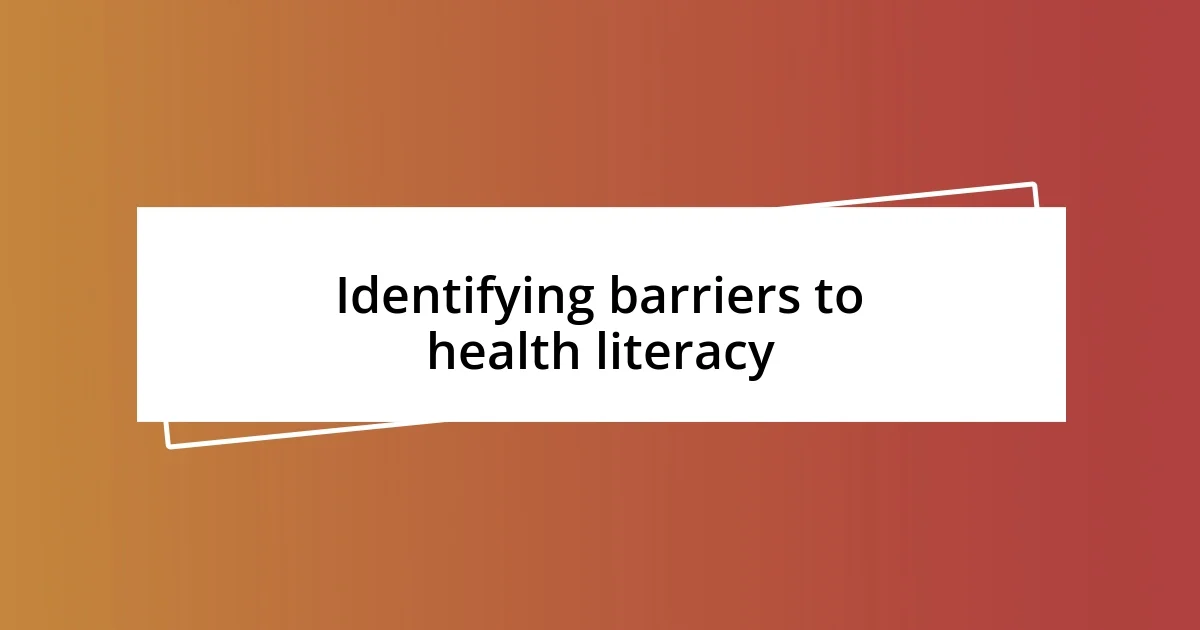
Identifying barriers to health literacy
Identifying barriers to health literacy can be quite revealing. I remember when I was trying to make sense of a medical pamphlet about diabetes management. I found myself struggling with the complexity of the language used, which made me realize that many people might experience the same frustration. These obstacles to comprehension can directly affect how we approach our health.
One prominent barrier is the socioeconomic factor. I had a friend who worked multiple jobs, barely having time to access healthcare resources. This made me appreciate how limited access to education and healthcare can stifle an individual’s ability to make informed health choices. The stress of financial instability often leaves little room for prioritizing health literacy.
Another barrier I discovered is cultural differences. Growing up in a multicultural environment, I often noticed varying levels of comfort with the healthcare system. For instance, some community members might avoid seeking medical advice due to language barriers or cultural beliefs about health. It’s a stark reminder that health literacy isn’t just about individual effort; it’s also shaped by the community’s support and understanding.
| Barrier | Description |
|---|---|
| Complex Language | Use of medical jargon can confuse patients. |
| Socioeconomic Factors | Limited financial and educational resources can hinder access to health information. |
| Cultural Differences | Language barriers and differing health beliefs can lead to misunderstanding. |
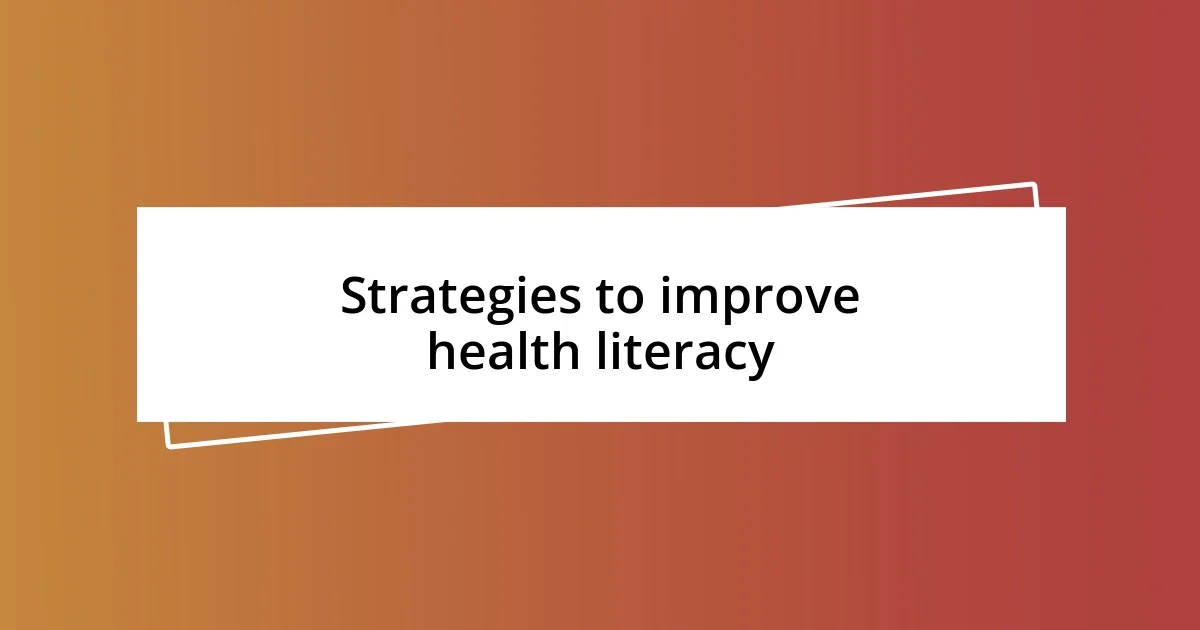
Strategies to improve health literacy
One effective strategy to improve health literacy is to simplify medical language. I recall attending a health seminar where the speaker used plain language to explain complex topics. It was refreshing to understand the information without feeling overwhelmed. This experience made me realize how critical it is for healthcare providers to communicate clearly and to tailor their messages to the audience’s understanding. If they can explain things without jargon, we’re more likely to grasp what’s truly important.
Engaging with health information proactively is another key strategy. I often find myself researching online before a doctor’s visit. This practice empowers me to ask more informed questions. Have you ever thought about how much more confident you feel when you walk into an appointment prepared? That little bit of homework can foster better conversations with healthcare professionals, ultimately leading to more personalized care.
Building a supportive community can also play a vital role in enhancing health literacy. I remember joining a local health advocacy group where we shared experiences and resources. Hearing others’ stories not only boosted my understanding but also made me feel less isolated in my health journey. Isn’t it amazing how much we can learn from one another? Creating spaces where individuals feel comfortable discussing their health challenges can dramatically increase overall literacy levels.
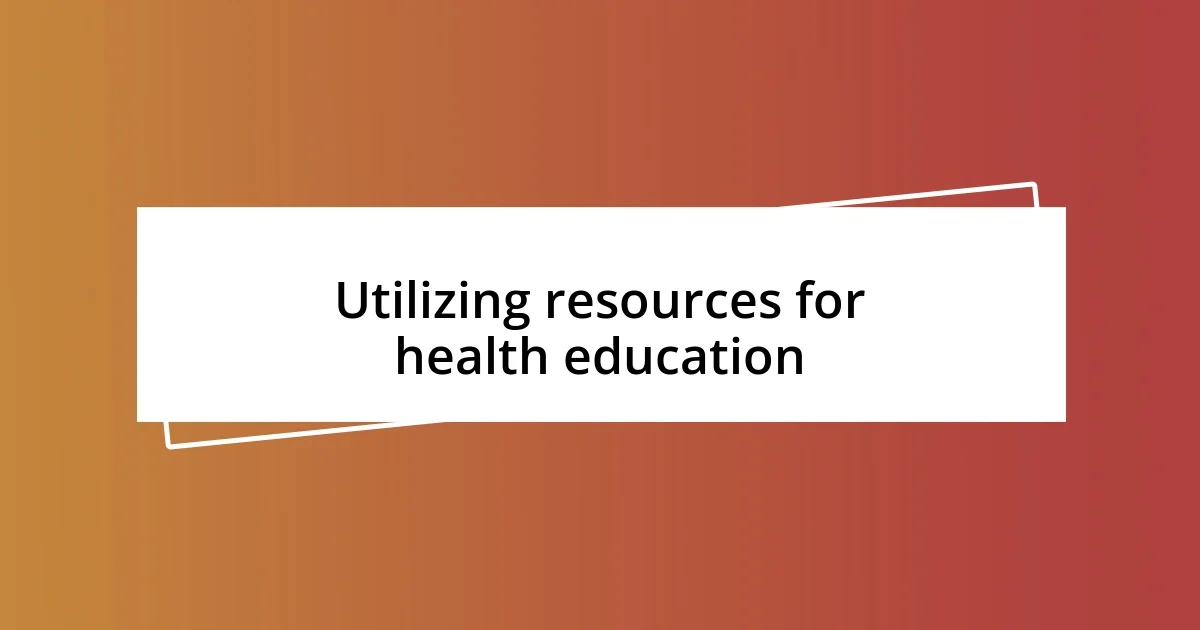
Utilizing resources for health education
Utilizing reliable resources for health education has been a game changer for my understanding of health concepts. I remember the first time I stumbled upon a well-designed health website filled with helpful articles and videos. It felt like a treasure trove of knowledge. Can you imagine having a wealth of information right at your fingertips? It’s empowering to have access to credible sources that break down complex issues, enabling me to make better decisions about my health.
I also recognize the importance of local community events in health education. Once, I attended a free health fair in my neighborhood, where healthcare professionals offered workshops on nutrition and fitness. The experience was enlightening and made me realize how engaging in such activities can foster a sense of belonging and motivate individuals to care about their health. Have you ever left an event feeling inspired and ready to take action? It’s a powerful reminder of how interactive experiences can make learning about health not only informative but also enjoyable.
Moreover, social media can serve as a double-edged sword in health education. While there’s a lot of misinformation out there, I’ve found valuable communities online that share accurate and relatable health tips. For instance, I follow a few trusted influencers who break down research studies in a way that feels approachable. Isn’t it fascinating how social platforms can connect us with diverse perspectives? This accessibility can spark conversations and promote lifelong learning about health topics, if we navigate the sea of information wisely.
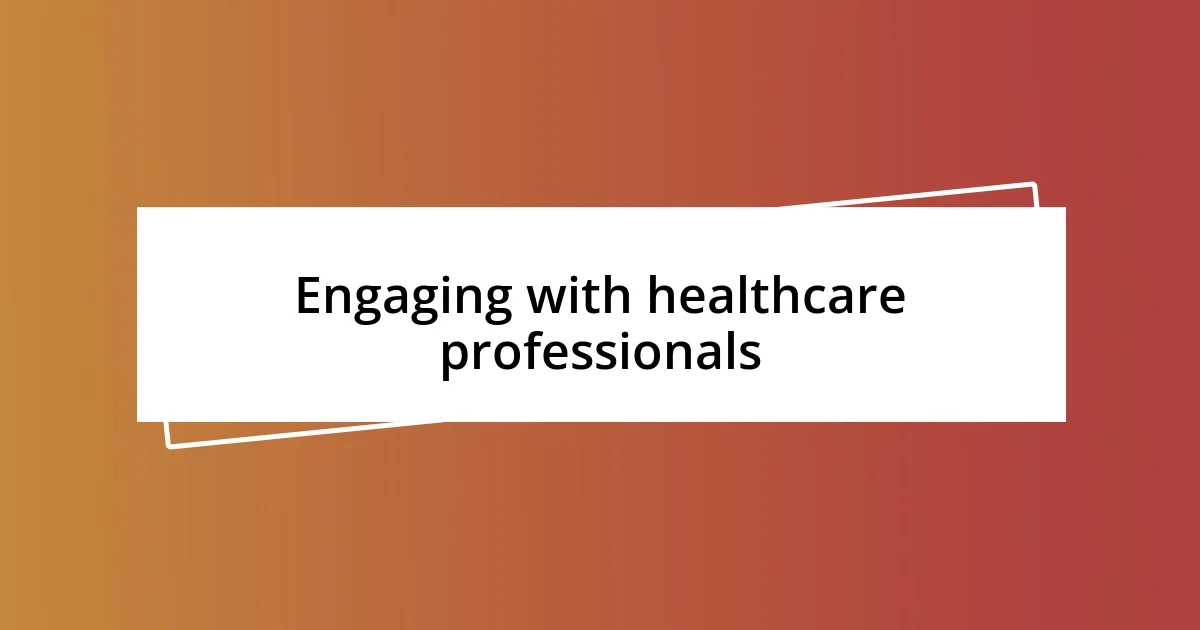
Engaging with healthcare professionals
Engaging with healthcare professionals is more than just attending appointments; it’s about cultivating a collaborative relationship. I vividly remember my first visit to a specialist, feeling nervous and unsure of how to communicate my concerns. I learned that actively participating in the conversation made all the difference. Have you noticed how discussing your thoughts openly can break down barriers? When I took the initiative to ask questions, I felt more empowered and involved in decisions about my health.
It’s also essential to practice good listening during these interactions. During a recent follow-up appointment, I made a point to really focus on my doctor’s explanations. I found that taking notes helped me grasp the essential details better. Have you ever noticed how much easier it is to recall information when it’s written down? This small act also allowed me to revisit the information later and gain a clearer understanding of the next steps in my care journey.
Lastly, I believe that setting a comfortable tone can significantly enhance these engagements. I try to build rapport by sharing a bit about myself, which often prompts healthcare professionals to do the same. For example, once, my doctor opened up about her experiences, making our conversation feel more like a dialogue than an interrogation. Isn’t it refreshing when both parties are genuinely invested in creating a supportive atmosphere? This practice not only strengthens my trust in them but also fosters a more meaningful exchange of ideas and concerns related to my health.
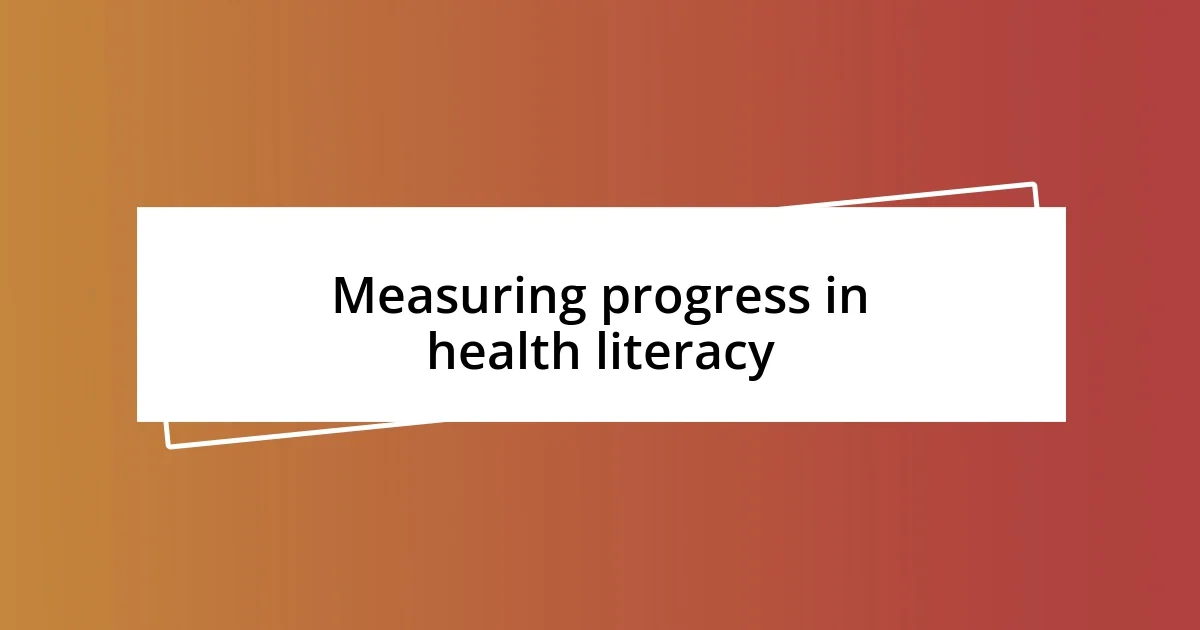
Measuring progress in health literacy
Measuring progress in health literacy can often feel like navigating a complex maze. The first time I took a health literacy assessment, I was surprised to discover the gaps in my understanding. It made me realize that acknowledging where I started was vital for mapping out my journey toward improvement. Have you ever taken a step back to evaluate your knowledge? That reflection can be incredibly revealing.
One effective way I track my progress is by setting specific learning goals. For instance, I aimed to understand medical terminology over the course of a few months. Each week, I dedicated time to reading articles and watching videos focused on a specific term or concept. It was rewarding—after completing that goal, I felt more equipped to engage in conversations with healthcare professionals. Isn’t it amazing how targeted efforts can transform your confidence in discussing your health?
I also find that tracking behavioral changes offers valuable insight into my health literacy growth. When I made a conscious effort to adopt healthier eating habits, I kept a journal. I noted not just what I ate but also my thoughts on nutrition and how certain foods affected my energy levels. Reflecting on those entries months later, I could see how much more knowledgeable I had become about food choices and their impacts on my well-being. Isn’t it enlightening to see tangible evidence of growth in such a personal aspect of life?











